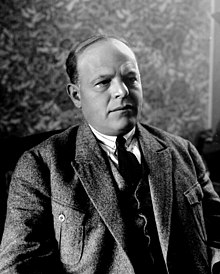Haim Nachman Bialik
| Chayyim Nahman Bialik | |
|---|---|

Hayyim Nahman Bialik, 1923
|
|
| Born |
January 9, 1873 Village of Radi, Volhynian Governorate, Russian Empire |
| Died | July 4, 1934 (aged 61) Vienna, Austria |
| Occupation | Poet, journalist, Children's writer, Translator |
| Literary movement | Hovevei Zion |
Hayim Nahman Bialik (Hebrew: חיים נחמן ביאליק; January 9, 1873 – July 4, 1934), also Chaim or Haim, was a Jewish poet who wrote primarily in Hebrew but also in Yiddish. Bialik was one of the pioneers of modern Hebrew poetry. He was part of the vanguard of Jewish thinkers who gave voice to the breath of new life in Jewish life. Bialik ultimately came to be recognized as Israel's national poet.
Bialik was born in the village of Radi, Volhynia in the Ukrainian part of the Russian Empire to Yitzhak Yosef Bialik, a scholar and businessman, and his wife Dinah (Priveh). Bialik's father died in 1880, when Bialik was 7 years old. In his poems, Bialik romanticized the misery of his childhood, describing seven orphans left behind—though modern biographers believe there were fewer children, including grown step-siblings who did not need to be supported. Be that as it may, from the age 7 onwards Bialik was raised in Zhitomir (also Ukraine) by his Orthodox grandfather, Yaakov Moshe Bialik.
In Zhitomir he received a traditional Jewish religious education, but also explored European literature. At the age of 15, inspired by an article he read, he convinced his grandfather to send him to the Volozhin Yeshiva in Lithuania, to study at a famous Talmudic academy under Rabbi Naftali Zvi Yehuda Berlin, where he hoped he could continue his Jewish schooling while expanding his education to European literature as well. Attracted to the Jewish Enlightenment movement (Haskala), Bialik gradually drifted away from yeshiva life. Poems such as HaMatmid ("The Talmud student") written in 1898, reflect his great ambivalence toward that way of life: on the one hand admiration for the dedication and devotion of the yeshiva students to their studies, on the other hand a disdain for the narrowness of their world.
...
Wikipedia
